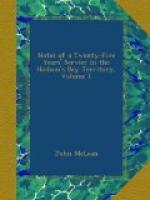Mr. E.’s zeal and piety promised the best results to the spiritual and eternal interests of his Indian brethren. His talents, energy, and fertility of resource, which seemed to rise with every obstacle, had the happiest effects on their temporal well-being; and his mild and winning manners greatly endeared him to all the Indians. But his useful and honourable career was drawing to a close. The mournful accident already alluded to had affected his health, and he now received his deathblow.
Yet, obnoxious as he had become to the Company, and formidable to their interests as they might deem one of his talents and indomitable resolution to be, the blow was not struck by them. It was dealt by a false brother; by one who had eaten of his bread: by a “familiar friend, with whom he had taken sweet counsel.” Charges affecting his character, both as a man and a minister, of the foulest and blackest kind, were transmitted to the Conference by a brother Missionary. To answer these charges, as false as they were foul, he was compelled to leave the churches he had planted and watered, to bid adieu to the people whose salvation had been for years the sole object of his life, and to undertake a voyage of 5,000 miles to appear before his brethren as a criminal. As a criminal, indeed, he was received; yet after an investigation, begun and carried on in no very friendly spirit to him, truth prevailed. He was declared innocent, and the right hand of fellowship was again extended to him. He made a short tour through England, and was everywhere received with respect, and affection, and sympathy.
But anxiety, and grief, and shame had done their work. Scarce three weeks had elapsed, when, having spent the evening along with Mrs. E. in the family of a friend, whose guest he was, with some of his wonted cheerfulness, Mrs. E. having retired but a few minutes, she was summoned to the room where she had left him in time to see him pass into that land where “the wicked cease from troubling.” The cause of his death was an affection of the heart. And that man—the slanderer—the murderer of this martyred Missionary—what punishment was inflicted on him? He is to this day unpunished! and yet lives in the Hudson’s Bay territory, the disgrace and opprobrium of his profession and his church.
Such are a few facts connected with the establishment of the Wesleyan Mission in the Hudson’s Bay territory, and illustrative of the sort of encouragement given by the Committee to Protestant Missionaries. By way of rider to these, I may just remind the reader that Roman Catholic Missionaries have since been freely permitted to plant churches wherever they pleased, even in districts where Protestant Missions were already established.




